Tablets
Cough and cold tablets are oral medications designed to alleviate persistent coughing. These tablets often contain ingredients like dextromethorphan to suppress the cough reflex or guaifenesin to aid in mucus clearance. Read More…

-
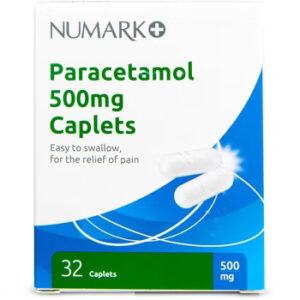
Paracetamol 500mg Capsules/Tablets
- Relieves Mild To Moderate Pain
- Active Ingredient: Paracetamol
- Reduces High Temperatures In Cold And Flu
£0.74 – £2.49 Select options -
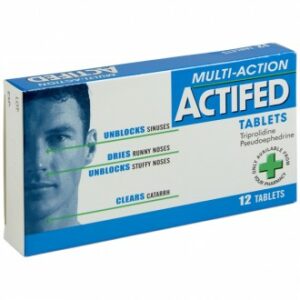
Actifed Multi-Action Tablets (12 Tablets)
- Relieves Blocked Noses And Sinuses
- Clears Catarrh
- Active Ingredients: Pseudoephedrine Hydrochloride And Triprolidine Hydrochloride
£4.49 Select options -
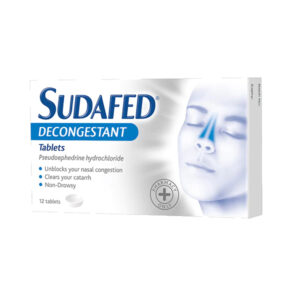
Sudafed Non Drowsy Decongestant Tablets
- Non-Drowsy Nose And Sinus Decongestant
- Active Ingredient: Pseudoephedrine Hydrochloride
- Clears Catarrh
£5.69 Select options -
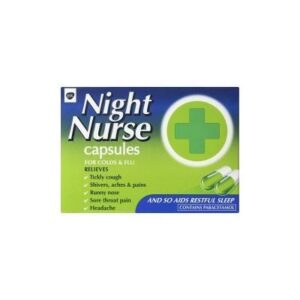
Night Nurse Cold And Flu Capsules – 10 Capsules
- Relieves Cold And Flu Symptoms
- Active Ingredients: Paracetamol, Pseudoephedrine Hydrochloride, Pholcodine, Promethazine Hydrochloride And Dextromethorphan Hydrobromide
- For 24 Hour Relief
£7.79 Select options -
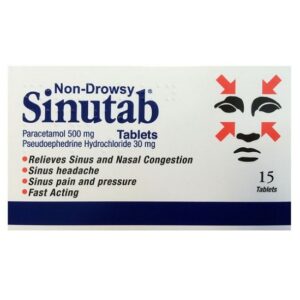
Sinutab Non-Drowsy Tablets
- Relieves Sinus Congestion, Headache And Pain
- Non-Drowsy
- Active Ingredients: Pseudoephedrine Hydrochloride And Paracetamol
£7.19 Select options -
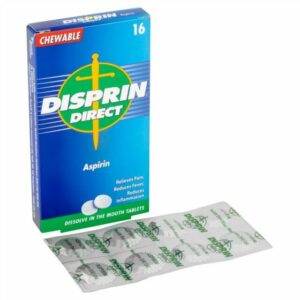
Disprin Direct Chewable Aspirin – 16 Tablets
- Active Ingredient: Aspirin
- Effective Pain Relief
- Next Day Delivery Available at Checkout
£3.19 Select options -
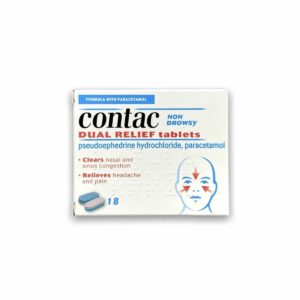
Contac Dual Relief Non-Drowsy – 18 Tablets
- Effective Nasal Congestion Relief
- Active Ingredients: Paracetamol & Pseudoephedrine
- Buy With Confidence From UK Registered Pharmacy
£7.69 Select options -
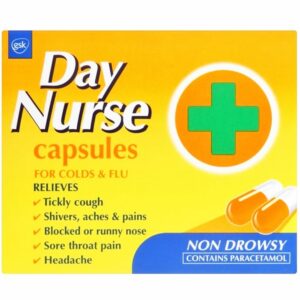
Day Nurse Capsules – 20 Capsules
- Relieves Cold And Flu Symptoms
- Active Ingredients: Paracetamol / Pseudoephedrine / Pholcodine
- For 24 Hour Relief
£10.49 Select options -
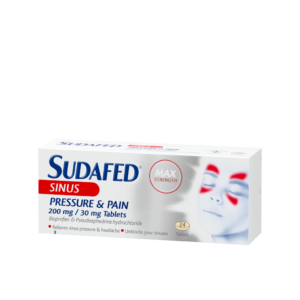
Sudafed Sinus Pressure & Pain 200mg/30mg Tablets
- Active ingredients: Ibuprofen & Pseudoephedrine
- Relieves sinus pain and congestion
- Tablets instead of nasal spray
£5.39 – £8.89 Select options -
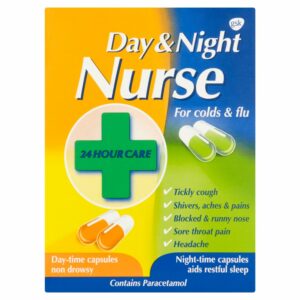
Day & Night Nurse Capsules – 24 Capsules
- Relieves Cold And Flu Symptoms
- Active Ingredients: Paracetamol, Pseudoephedrine Hydrochloride, Pholcodine, Promethazine Hydrochloride And Dextromethorphan Hydrobromide
- For 24 Hour Relief
£10.49 Select options -
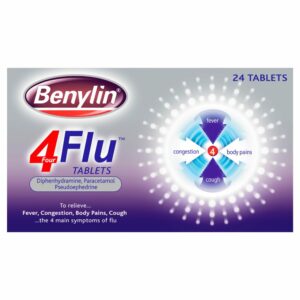
Benylin 4 Flu Tablets – 24 Tablets
- Relieves Cold And Flu Symptoms
- Active Ingredients: Paracetamol, Pseudoephedrine Hydrochloride, Pholcodine, Promethazine Hydrochloride And Dextromethorphan Hydrobromide
- For 24 Hour Relief
£7.79 Select options -
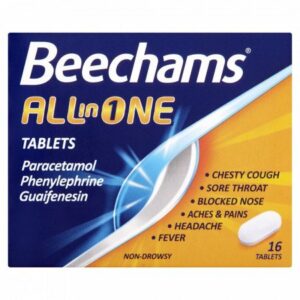
Beechams All In One Tablets – 16 Tablets
- Relieves Cold And Flu Symptoms
- Active Ingredients: Paracetamol, Guaifenesin And Phenylephrine Hydrochloride
- Non-Drowsy
£5.89 Select options -
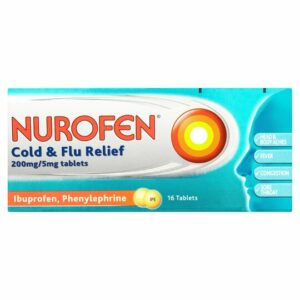
Nurofen Cold & Flu Relief 200mg/5mg – 16 Tablets
- Effective Cold & Flu Relief
- Active Ingredients: Ibuprofen & Phenylephrine
- Buy With Confidence From UK Registered Pharmacy
£7.49 Add to basket -
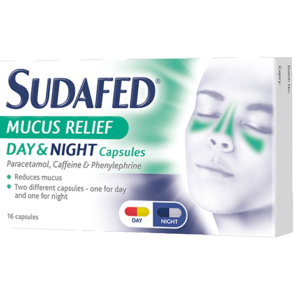
Sudafed Mucus Relief Day & Night Capsules – 16 Capsules
- Active Ingredients Paracetamol, Caffeine and Phenylephrine
- Both Daytime & Nighttime Relief
- Buy With Confidence From UK Registered Pharmacy
£6.29 Select options -
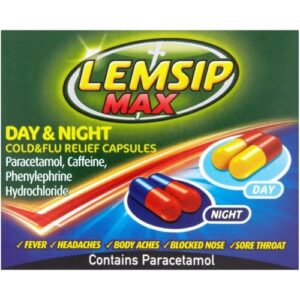
Lemsip Max Cold & Flu Relief Day & Night Capsules – 16 Capsules
- For The Relief Of Flu & Colds
- Active Ingredients: Paracetamol, Phenylephrine & Caffiene
- Buy With Confidence From UK Registered Pharmacy
£6.99 Select options -
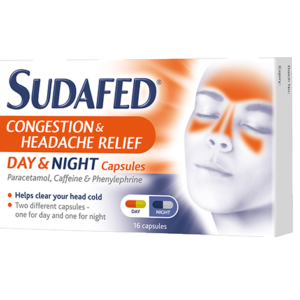
Sudafed Congestion & Headache Relief Day & Night Capsules – 16 Capsules
- Congestion & Headache Relief
- Active Ingredients: Paracetamol /Caffeine /Phenylephrine
- Next Day Delivery Available
£6.49 Add to basket -
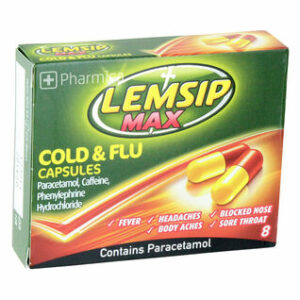
Lemsip Max Cold & Flu Capsules – 8 Capsules
- For The Relief Of Flu & Colds
- Active Ingredients: Paracetamol, Phenylephrine & Caffiene
- Buy With Confidence From UK Registered Pharmacy
£4.49 Add to basket -
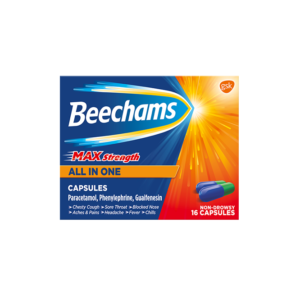
Beechams Max Strength All In One Capsules – 16 Capsules
- For The Relief Of Cold Or Flu
- Active Ingredients: Paracetamol, Phenylephrine & Guaifenesin
- Buy With Confidence From UK Registered Pharmacy
£7.39 Add to basket -
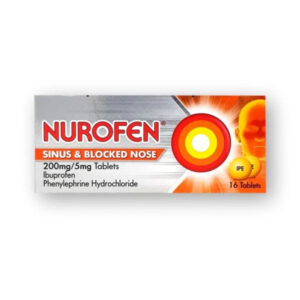
Nurofen Sinus & Blocked Nose 200mg/5mg Tablets – 16 Tablets
- For The Relief Of Flu & Colds
- Active Ingredients: Phenylephrine & Ibuprofen
- Buy With Confidence From UK Registered Pharmacy
£6.69 Read more -
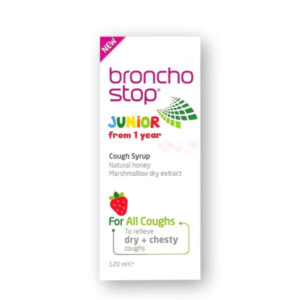
Buttercup Bronchostop Junior Cough Syrup – 120ml
- For The Relief Of A Cough
- Traditional Herbal Medicine
- Buy With Confidence From UK Registered Pharmacy
£6.99 Add to basket -
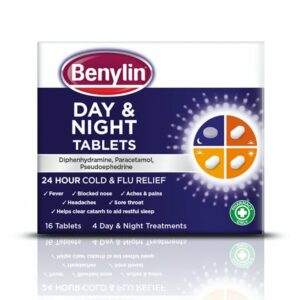
Benylin Day and Night Tablets – 16 Tablets
- Contains Diphenhydramine, Paracetamol, Pseudoephedrine
- 24 hour cold and flu relief
- 4 day & night treatments
£6.49 Select options
-
About Cough and Cold Tablets
Cough tablets are oral medications specifically formulated to alleviate persistent and disruptive coughing. They typically contain active ingredients that either suppress the cough reflex or facilitate the expulsion of mucus in productive coughs. Common compounds include dextromethorphan for cough suppression and guaifenesin for mucus clearance. These tablets are designed to provide relief from the symptoms of coughs and colds, helping to improve comfort and overall well-being during illness.
-
Symptoms
The symptoms of a cough and cold can vary but often include:
Persistent Cough: A continuous, dry or productive cough that can be irritating and disruptive.
Nasal Congestion: A blocked or runny nose, often accompanied by sinus pressure.
Sore Throat: Irritation or pain in the throat, often worsened by swallowing.
Body Aches: General discomfort or achiness in the muscles.
Fatigue: A feeling of tiredness or exhaustion.
Fever: An elevated body temperature, indicating an immune response.It’s important to monitor symptoms and seek medical advice if they worsen or persist.
-
Diagnosis
Diagnosing a cough or cold usually starts with a review of symptoms and a physical examination by a healthcare professional. If the cough is persistent or accompanied by more serious symptoms, further tests may be conducted:
Chest X-ray: To check for lung infections such as pneumonia.
Sputum Test: To identify bacteria if a bacterial infection is suspected.
Spirometry: A lung function test to assess for conditions like asthma or chronic obstructive pulmonary disease (COPD).
Blood Tests: To check for infections or other underlying conditions.The treatment for coughs and colds in the UK often involves over-the-counter medications to relieve symptoms. These can include:
Decongestants: To reduce nasal congestion.
Cough Suppressants (Antitussives): To reduce coughing.
Expectorants: To loosen mucus so it can be coughed up more easily.
Pain Relievers: Such as paracetamol or ibuprofen, to reduce fever and alleviate aches and pains.It’s important to read the label and follow the instructions on over-the-counter medications. For more persistent or severe coughs, it’s advisable to consult with a healthcare professional for a proper diagnosis and treatment plan.
-
Treatment for Coughs and Colds
Over-the-counter cough and cold tablets offer a variety of treatment options to alleviate symptoms. Some of the highlighted products include:
Actifed Multi-Action Tablets: These tablets provide relief from symptoms such as a blocked nose, sinus pressure, and catarrh, making them a versatile option for cold relief.
Sudafed Non-Drowsy Decongestant Tablets: Ideal for those who need to stay alert, these tablets effectively clear nasal congestion and catarrh without causing drowsiness.
Night Nurse Cold and Flu Capsules: Formulated for night time use, these capsules provide 24-hour relief from cold and flu symptoms, helping you get a good night’s sleep.
Benylin 4 Flu Tablets: Targeting multiple symptoms, these tablets offer comprehensive relief from the discomforts of cold and flu.These medications work by targeting various symptoms, such as cough, congestion, and fever, to provide relief and aid in recovery. Always follow the instructions on the packaging and consult a healthcare professional if symptoms persist.
-
Prevention Strategies
To reduce the chances of catching a cold and help prevent the spread of viruses to others, consider following these instructions:
Wash Your Hands Regularly: Use warm water and soap to remove germs that can cause colds. This simple step can significantly reduce the risk of infection.
Avoid Touching Your Face: Try not to touch your eyes, nose, or mouth, as this is a common way for viruses to enter the body.
Stay Hydrated: Drinking plenty of water can help keep your throat moist and reduce the risk of getting a cold.
Maintain a Healthy Lifestyle: Regular exercise and a balanced diet can help boost your immune system, making you less susceptible to colds.
Get Enough Sleep: Adequate rest is crucial for maintaining a strong immune system.
Use Tissues: When you cough or sneeze, use a tissue to trap germs, and dispose of it quickly.
Avoid Close Contact: Try to keep your distance from people who are sick, and avoid sharing personal items like towels or cups.
Keep Surfaces Clean: Regularly disinfect surfaces that are frequently touched, such as doorknobs and light switches.
Consider Vaccination: While there’s no vaccine for the common cold, getting vaccinated for the flu can help prevent a major cause of cold-like symptoms.












